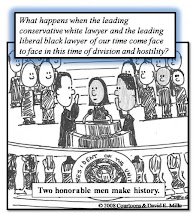 The Herald today does an important feature on how Governor Crist will work to insure court funding, we hope. It seems you should read this before getting to the statement by Judge Tobin.
The Herald today does an important feature on how Governor Crist will work to insure court funding, we hope. It seems you should read this before getting to the statement by Judge Tobin.
Statements by Judges Address Court Funding Crisis
I am writing to explain why I, on behalf of the Seventeenth Judicial Circuit, have pledged to support HB1121 and SB2108. Both Bills attempt to accomplish two things:
First, to place Court operating functions presently performed by the Clerk under the control of Court Administration.
It is fact that this would require personnel to move from the Clerks' payroll to the State payroll. In July 2004, that is what happened to all Court Administration employees, they moved onto the payroll of the State. There was a lot of work to accomplish this mission to be sure, but there was no panic, no wholesale termination of employees. It is unfair to portray this as anything other than the transfer by law of employees from one payroll to another. Panic should not be the order of the day.
Second, both Bills attempt to effectuate transparency in what happens to the filing fees, court costs, fines, etc. presently collected by the Clerks. The Bills would give the legislature oversight over the money resulting in the Clerks going though the same budgetary process the Courts presently use to obtain approval of budgets. The Clerks' offices set their own budgets without legislative oversight.
It's as if a fourth branch of government was created by statute in July 2004 that reports to themselves on budget issues, it's called the Florida Court Clerks Association.
They have hired the best, most expensive, and as many lobbyists as they want with your money to fight against HB1121 and SB2108. It would be interesting to find out how much of the funds the Court raised are being spend on lobbyists to oppose Bills the Courts favor. Only in America should be the slogan of the day.
Legislative oversight is key to the checks and balances in our government. Everyone should be treated equally under the law, this is a basic premise. While the Courts, State Attorneys, Public Defenders, Attorney General, Governor's Office, Highway Patrol, Department of Children and Family Services, and services provided to the poor and needy, etc. were laboring under the extreme pressure of budget cuts, the Clerks were hiring and giving bonuses. They did so legally with the very money the Courts raise with filing fees, court costs, and fines etc. The Clerks simply collect the money, but it is the Courts that raise the money and it is very profitable, but the Courts see very little of the funds. This must change.
We must have a permanent sustainable funding source created and overseen by the legislature. The Courts handle the same workload as the Clerks in a different form. Workloads increased for both the Clerks and the Courts. The personnel in the Courts labored without raises and some were furloughed while others were lost through attrition. On the other hand, Clerks hired and gave bonuses. Perhaps no one had to be furloughed; maybe everyone could have received bonuses. We don't know because the legislature isn't privy to the exact amount of money that is being collected or doled out by the Clerks or if it is being done in the most efficient way. I urge you to contact your legislators and tell them we want good government that is open and fair to all.
My office will supply a list of legislators to you on Monday.
First, to place Court operating functions presently performed by the Clerk under the control of Court Administration.
It is fact that this would require personnel to move from the Clerks' payroll to the State payroll. In July 2004, that is what happened to all Court Administration employees, they moved onto the payroll of the State. There was a lot of work to accomplish this mission to be sure, but there was no panic, no wholesale termination of employees. It is unfair to portray this as anything other than the transfer by law of employees from one payroll to another. Panic should not be the order of the day.
Second, both Bills attempt to effectuate transparency in what happens to the filing fees, court costs, fines, etc. presently collected by the Clerks. The Bills would give the legislature oversight over the money resulting in the Clerks going though the same budgetary process the Courts presently use to obtain approval of budgets. The Clerks' offices set their own budgets without legislative oversight.
It's as if a fourth branch of government was created by statute in July 2004 that reports to themselves on budget issues, it's called the Florida Court Clerks Association.
They have hired the best, most expensive, and as many lobbyists as they want with your money to fight against HB1121 and SB2108. It would be interesting to find out how much of the funds the Court raised are being spend on lobbyists to oppose Bills the Courts favor. Only in America should be the slogan of the day.
Legislative oversight is key to the checks and balances in our government. Everyone should be treated equally under the law, this is a basic premise. While the Courts, State Attorneys, Public Defenders, Attorney General, Governor's Office, Highway Patrol, Department of Children and Family Services, and services provided to the poor and needy, etc. were laboring under the extreme pressure of budget cuts, the Clerks were hiring and giving bonuses. They did so legally with the very money the Courts raise with filing fees, court costs, and fines etc. The Clerks simply collect the money, but it is the Courts that raise the money and it is very profitable, but the Courts see very little of the funds. This must change.
We must have a permanent sustainable funding source created and overseen by the legislature. The Courts handle the same workload as the Clerks in a different form. Workloads increased for both the Clerks and the Courts. The personnel in the Courts labored without raises and some were furloughed while others were lost through attrition. On the other hand, Clerks hired and gave bonuses. Perhaps no one had to be furloughed; maybe everyone could have received bonuses. We don't know because the legislature isn't privy to the exact amount of money that is being collected or doled out by the Clerks or if it is being done in the most efficient way. I urge you to contact your legislators and tell them we want good government that is open and fair to all.
My office will supply a list of legislators to you on Monday.
Vic Tobin Chief Judge-Seventeenth Judicial Circuit
Now by Judge Farina:
Court Funding: Fact vs. Fiction
Court Funding: Fact vs. Fiction
Open Letter to Courthouse Staff and Members of the Pubic March 20, 2009
The purpose of this open letter is to clarify misconceptions being circulated by opponents of SB 2108 and HB 1121 - two bills that deal with court funding and are now before the state legislature.
FICTION : These bills are a "money grab" by the courts and would take all fines, fees, and court costs collected by the clerks and redirect them to the courts.
FACT : All court-related revenues, which are assessed by judges, paid by the public and merely collected by the clerks, would be directed to legislative budget committees, and thereafter appropriated to state trust funds, under the control of the legislature, to be distributed to entities within the justice system, including the courts, the state attorneys, and the public defenders.
FACT : Currently, all revenues collected by the clerks are kept by the clerks to fund their budgets, which are managed internally by the clerks, without any direction or control by the legislature. Any excess funds not needed by the clerks are then returned to the state's general revenue fund. The clerks are the only state-funded entity permitted to manage public dollars without legislative oversight.
FACT : While all other entities receiving state funds - including public schools, police departments and social service agencies serving the state's most vulnerable citizens - have been forced to lay off employees and cut back on critical public services, the clerks have been hiring and handing out bonuses to their employees, as recently acknowledged by John Dew, Executive Director of the Clerks of Court Operating Corporation, during a House Criminal and Civil Justice Appropriations Committee meeting in Tallahassee.
FACT : Recognizing the need to end the clerks' inequitable budgeting and spending practices, the Senate Judiciary Committee on Wednesday, March 18, 2009, voted unanimously in favor of SB 2108, which states, in part: "The Legislature finds that, in order to enhance accountability and efficiency in state funding of court-related functions...it is necessary to provide for the appropriation of revenues from fines, fees, service charges, and costs to the clerks of court through the appropriations act . It is, therefore, the intent of the Legislature to facilitate the orderly transition from the current clerk budgeting process...to the legislative appropriation of funds... (emphasis added)."
FICTION : These bills are a "power grab" by the courts and would place all court records under the control of judges. The clerk's office would cease to exist and hundreds of employees would lose their jobs. FACT : Under state law, the clerks provide ministerial functions related to record-keeping for the courts, and those functions are already under the control of judges . Accordingly, only the clerks' court-related functions are under consideration for transfer to the courts - all other County-related duties and responsibilities would remain intact. Clerk em ployees who provide record-keeping functions in court would have the same job, only funded by the state.
FICTION : The clerks are constitutional officers and provide a "check and balance" on the judiciary.
FACT : The Florida Constitution provides that a publicly elected clerk shall exist, but lets the legislature define the clerk's functions and duties. The only entities authorized under the Florida Constitution to serve as a check and balance on :placeFlorida 's judicial branch are the legislative branch, and the executive branch. There is no fourth branch known as the clerks. SB 2108 and HB 1121 are an attempt to bring the public dollars merely collected by the clerks into the same legislative funding process that all other state entities participate in every year. All public dollars should be accounted for and distributed by the legislature, the public's elected representatives.
The purpose of this open letter is to clarify misconceptions being circulated by opponents of SB 2108 and HB 1121 - two bills that deal with court funding and are now before the state legislature.
FICTION : These bills are a "money grab" by the courts and would take all fines, fees, and court costs collected by the clerks and redirect them to the courts.
FACT : All court-related revenues, which are assessed by judges, paid by the public and merely collected by the clerks, would be directed to legislative budget committees, and thereafter appropriated to state trust funds, under the control of the legislature, to be distributed to entities within the justice system, including the courts, the state attorneys, and the public defenders.
FACT : Currently, all revenues collected by the clerks are kept by the clerks to fund their budgets, which are managed internally by the clerks, without any direction or control by the legislature. Any excess funds not needed by the clerks are then returned to the state's general revenue fund. The clerks are the only state-funded entity permitted to manage public dollars without legislative oversight.
FACT : While all other entities receiving state funds - including public schools, police departments and social service agencies serving the state's most vulnerable citizens - have been forced to lay off employees and cut back on critical public services, the clerks have been hiring and handing out bonuses to their employees, as recently acknowledged by John Dew, Executive Director of the Clerks of Court Operating Corporation, during a House Criminal and Civil Justice Appropriations Committee meeting in Tallahassee.
FACT : Recognizing the need to end the clerks' inequitable budgeting and spending practices, the Senate Judiciary Committee on Wednesday, March 18, 2009, voted unanimously in favor of SB 2108, which states, in part: "The Legislature finds that, in order to enhance accountability and efficiency in state funding of court-related functions...it is necessary to provide for the appropriation of revenues from fines, fees, service charges, and costs to the clerks of court through the appropriations act . It is, therefore, the intent of the Legislature to facilitate the orderly transition from the current clerk budgeting process...to the legislative appropriation of funds... (emphasis added)."
FICTION : These bills are a "power grab" by the courts and would place all court records under the control of judges. The clerk's office would cease to exist and hundreds of employees would lose their jobs. FACT : Under state law, the clerks provide ministerial functions related to record-keeping for the courts, and those functions are already under the control of judges . Accordingly, only the clerks' court-related functions are under consideration for transfer to the courts - all other County-related duties and responsibilities would remain intact. Clerk em ployees who provide record-keeping functions in court would have the same job, only funded by the state.
FICTION : The clerks are constitutional officers and provide a "check and balance" on the judiciary.
FACT : The Florida Constitution provides that a publicly elected clerk shall exist, but lets the legislature define the clerk's functions and duties. The only entities authorized under the Florida Constitution to serve as a check and balance on :placeFlorida 's judicial branch are the legislative branch, and the executive branch. There is no fourth branch known as the clerks. SB 2108 and HB 1121 are an attempt to bring the public dollars merely collected by the clerks into the same legislative funding process that all other state entities participate in every year. All public dollars should be accounted for and distributed by the legislature, the public's elected representatives.
Sincerely,
Joseph P. Farina, Chief Judge 11 th Judicial Circuit of Florida
































No comments:
Post a Comment